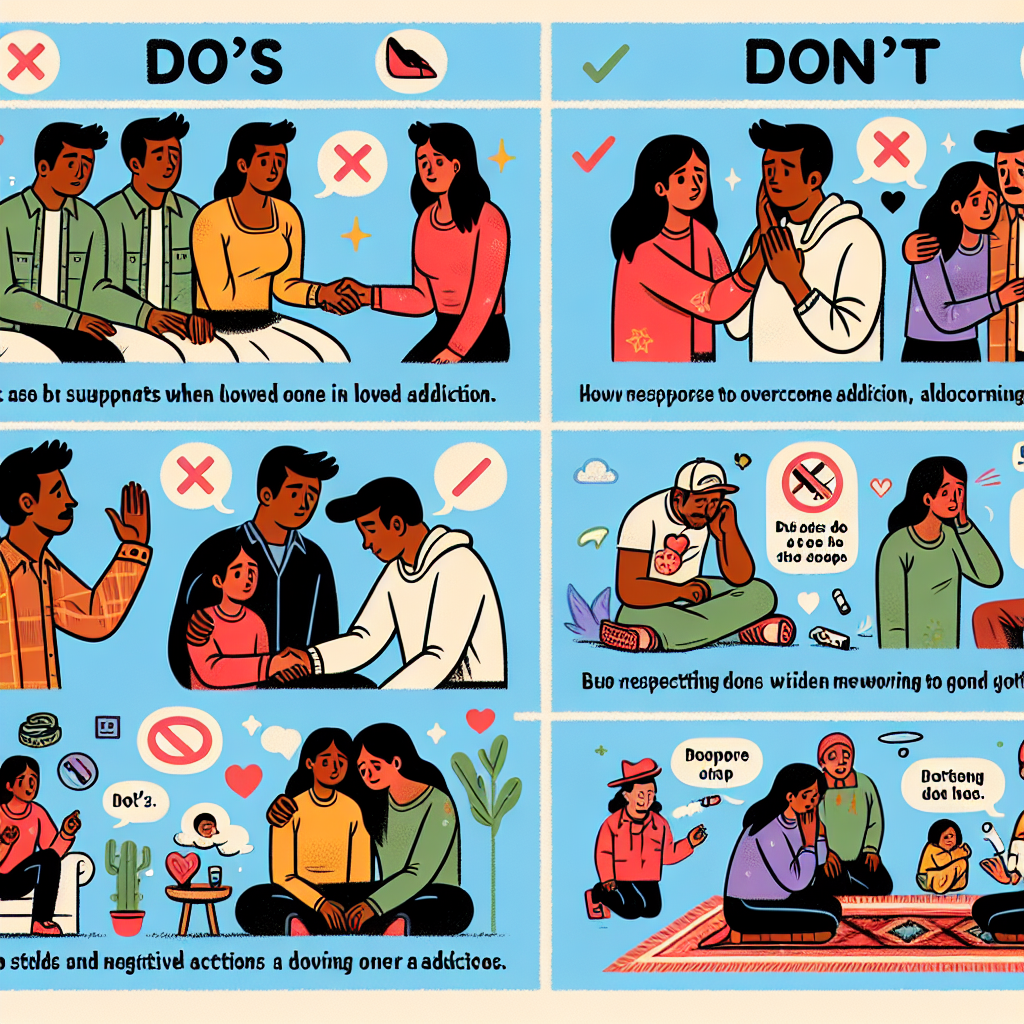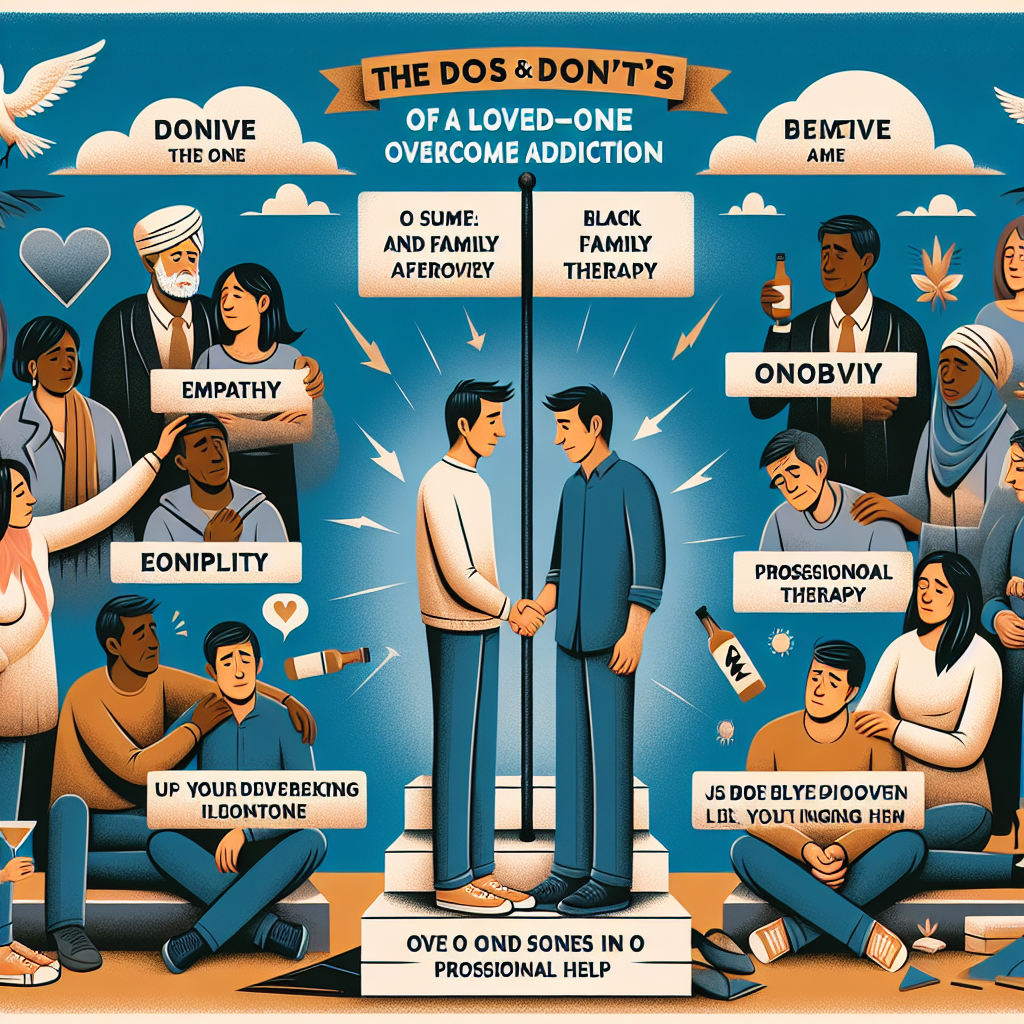-
Table of Contents

“Guiding with Care: The Essential Do’s and Don’ts for Supporting a Loved One Through Addiction Recovery”
Introduction
Helping a loved one overcome addiction is a delicate and challenging process that requires a thoughtful and informed approach. The journey to recovery is often fraught with emotional, psychological, and physical hurdles, making it essential to understand the best practices for providing support. The do’s and don’ts of helping a loved one overcome addiction serve as a crucial guide to navigate this complex terrain. By adhering to these guidelines, you can offer meaningful assistance while avoiding actions that may inadvertently hinder their progress. This introduction aims to outline the fundamental principles that can make a significant difference in the recovery journey, ensuring that your support is both compassionate and effective.
The Do’s And Don’ts Of Offering Emotional Support To A Loved One Battling Addiction
Supporting a loved one through the arduous journey of overcoming addiction is a delicate and often challenging endeavor. It requires a balance of empathy, patience, and understanding, as well as a clear awareness of what actions can be beneficial and which might inadvertently cause harm. Offering emotional support is a crucial component of this process, and knowing the do’s and don’ts can make a significant difference in the recovery journey.
First and foremost, it is essential to approach your loved one with compassion and without judgment. Addiction is a complex disease, often rooted in deep-seated emotional or psychological issues. By showing empathy and understanding, you create a safe space where your loved one feels valued and supported. This can encourage them to open up about their struggles and seek the help they need. On the other hand, it is important to avoid criticism or blame. Negative judgments can lead to feelings of shame and guilt, which may exacerbate the addiction rather than alleviate it.
Listening actively is another vital aspect of offering emotional support. When your loved one speaks about their experiences and feelings, give them your full attention. This means putting aside distractions, maintaining eye contact, and responding thoughtfully. Active listening demonstrates that you genuinely care about their well-being and are there to support them unconditionally. Conversely, interrupting or offering unsolicited advice can make them feel unheard and misunderstood, potentially pushing them further away.
Encouraging professional help is also a key component of supporting someone with an addiction. While your emotional support is invaluable, addiction often requires specialized treatment from healthcare professionals. Gently suggest that they seek help from a therapist, counselor, or support group. Offer to assist them in finding resources or accompany them to appointments if they feel comfortable. However, it is crucial not to force or pressure them into seeking help, as this can lead to resistance and resentment. Instead, provide information and support their decision-making process.
Setting healthy boundaries is another important aspect of offering emotional support. While it is natural to want to help your loved one, it is also essential to take care of your own well-being. Establishing boundaries ensures that you do not become overwhelmed or enable their addictive behaviors. For instance, you might decide not to provide financial assistance if it is likely to be used to support their addiction. Communicate these boundaries clearly and kindly, emphasizing that they are in place to protect both of you.
Moreover, celebrating small victories can have a profound impact on your loved one’s recovery journey. Acknowledge and praise their efforts, no matter how minor they may seem. Positive reinforcement can boost their self-esteem and motivate them to continue working towards sobriety. However, it is equally important to be patient and understanding during setbacks. Recovery is rarely a linear process, and relapses can occur. Instead of expressing disappointment or frustration, offer reassurance and remind them that setbacks are a part of the journey.
In conclusion, offering emotional support to a loved one battling addiction involves a delicate balance of empathy, active listening, encouragement, boundary-setting, and positive reinforcement. By approaching the situation with compassion and understanding, you can create a supportive environment that fosters healing and growth. Remember that your role is to support and guide, not to control or fix. With patience and perseverance, you can help your loved one navigate the challenging path to recovery.
Practical Steps And Pitfalls To Avoid When Assisting A Loved One In Addiction Recovery
Helping a loved one overcome addiction is a journey fraught with emotional highs and lows, requiring patience, understanding, and a well-thought-out approach. While the desire to help is natural, knowing the practical steps to take and the pitfalls to avoid can make a significant difference in the recovery process. First and foremost, it is crucial to educate yourself about addiction. Understanding that addiction is a complex disease, not a moral failing, can foster empathy and patience. This knowledge will also equip you to better support your loved one through the ups and downs of recovery.
One of the most important steps you can take is to encourage professional help. Addiction often requires medical and psychological intervention, and professionals can provide the structured support necessary for recovery. Whether it’s through inpatient rehab, outpatient programs, or therapy, professional guidance can offer a tailored approach to your loved one’s specific needs. However, while encouraging professional help, it’s essential to avoid being overbearing. Pushing too hard can lead to resistance, making it crucial to strike a balance between encouragement and respect for their autonomy.
In addition to professional help, creating a supportive environment at home is vital. This means removing any substances that could trigger a relapse and fostering a positive, stress-free atmosphere. Emotional support is equally important. Listening without judgment, offering words of encouragement, and being there during difficult times can make a world of difference. However, it’s important to set boundaries. Enabling behaviors, such as giving money or making excuses for their actions, can hinder recovery. Instead, focus on supporting their efforts to stay clean and make positive changes.
Communication is another key element in helping a loved one overcome addiction. Open, honest conversations about their struggles and your concerns can pave the way for mutual understanding and cooperation. However, it’s crucial to approach these conversations with empathy and without blame. Accusatory language can lead to defensiveness and hinder progress. Instead, use “I” statements to express your feelings and concerns, which can help maintain a constructive dialogue.
While supporting your loved one, it’s also important to take care of yourself. The emotional toll of helping someone through addiction can be overwhelming, and neglecting your own well-being can lead to burnout. Seeking support from friends, family, or support groups can provide the emotional sustenance you need. Remember, you can’t pour from an empty cup; taking care of yourself enables you to be a better support system for your loved one.
Another pitfall to avoid is expecting immediate results. Recovery is a long-term process with its share of setbacks. Patience is crucial, as is celebrating small victories along the way. Acknowledging progress, no matter how minor, can boost your loved one’s morale and reinforce their commitment to recovery.
Lastly, it’s important to recognize that relapse can be a part of the recovery journey. While it’s disheartening, it doesn’t mean failure. Instead of reacting with disappointment or anger, approach the situation with understanding and encourage them to get back on track. Relapse can provide valuable insights into triggers and areas that need more focus, making it a learning opportunity rather than a defeat.
In conclusion, helping a loved one overcome addiction requires a delicate balance of support, boundaries, and patience. By educating yourself, encouraging professional help, creating a supportive environment, maintaining open communication, taking care of yourself, and understanding the nature of recovery, you can play a pivotal role in their journey towards a healthier, addiction-free life.
Q&A
1. **Do: Offer Support and Encouragement**
– Be patient and listen without judgment. Encourage them to seek professional help and attend support groups.
2. **Don’t: Enable Their Behavior**
– Avoid giving them money, covering up their actions, or making excuses for them. This can prevent them from facing the consequences of their addiction and seeking help.
Conclusion
In conclusion, helping a loved one overcome addiction requires a balanced approach of support, understanding, and boundaries. Do offer emotional support, encourage professional treatment, educate yourself about addiction, and practice patience. Don’t enable their behavior, judge or criticize, neglect your own well-being, or expect immediate results. By following these guidelines, you can provide meaningful assistance while fostering a healthier environment for both your loved one and yourself.



